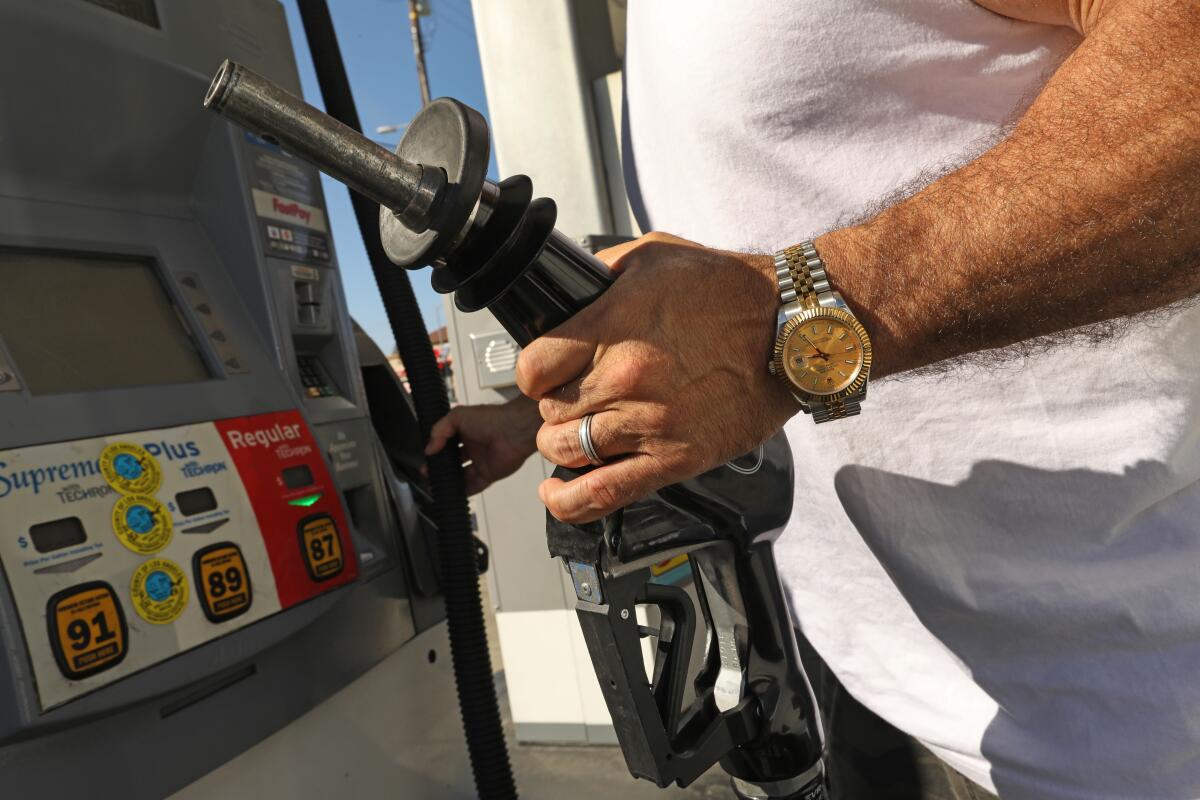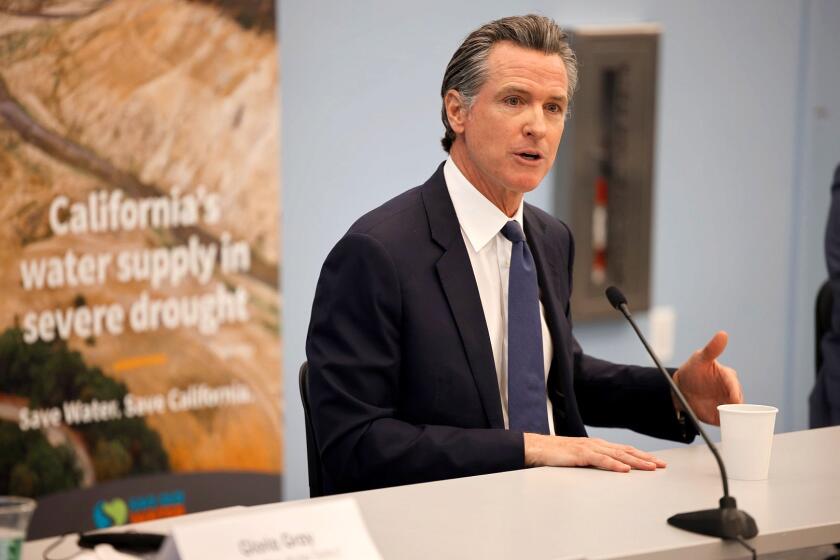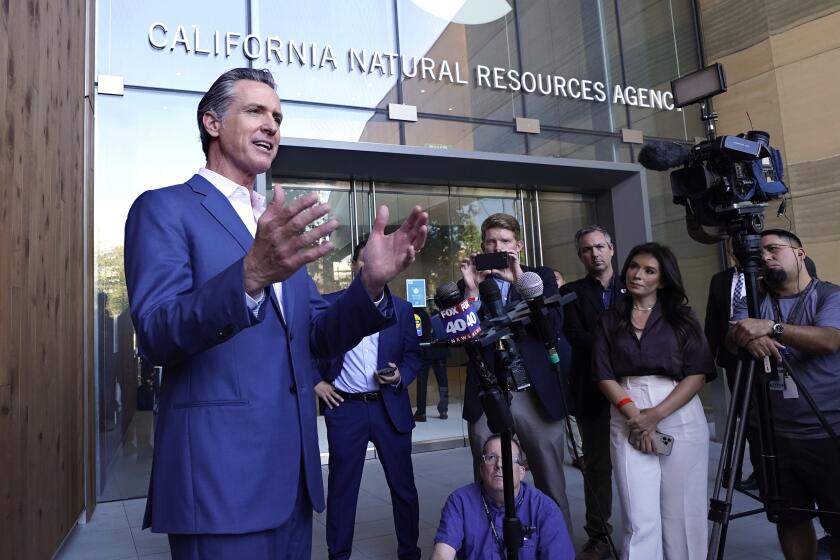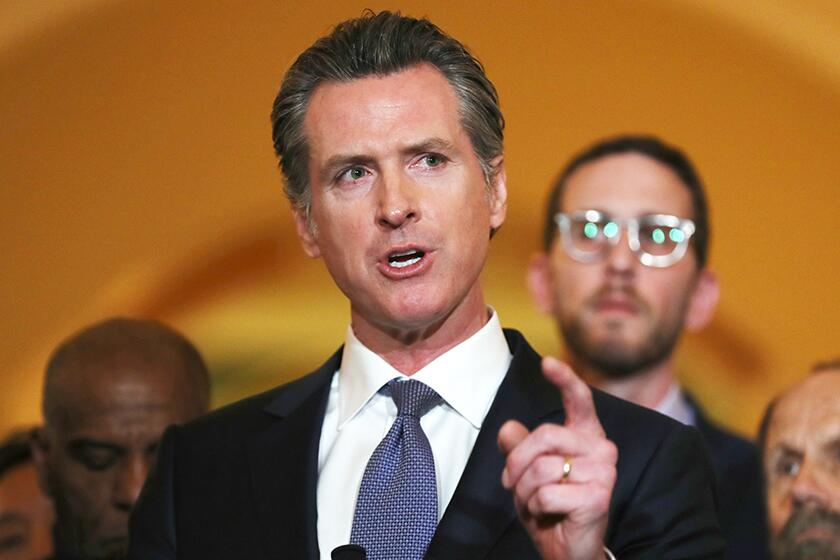With California battered by high gas prices, Newsom wants to penalize big oil companies

SACRAMENTO â A new class of state lawmakers will be sworn in Monday and thrust into the middle of Gov. Gavin Newsomâs political fight with oil companies, testing the clout of an industry that spends heavily to influence the Legislature and potentially affecting gas prices for Californians.
Newsom has accused the oil industry of intentionally âprice gougingâ consumers at the pump as retribution for the stateâs policies to phase out dependence on fossil fuels in an effort to curb climate change. The petroleum industry argues the consequences of those policies and the stateâs dependence on a small number of oil refineries drives up gasoline costs.
In response to gas price spikes this year, the governor pledged to back bills to place new monetary penalties on excessive oil company profits in a special legislative session.
The stakes are particularly high for lawmakers. The Legislature opens the special session Monday, the same day lawmakers are sworn into office after oil companies and their trade union allies spent millions of dollars to help elect Republicans and moderate Democrats to the statehouse.
âThe fact that the governor put a spotlight on this in a special session means that these are not votes that will be forgotten,â said Jamie Court, president of Consumer Watchdog, which supports Newsomâs effort. âThis is going to be a career-defining vote for every legislator in the building.â
The sting of high gas prices has been felt all over the world. One week before the November election, President Biden threatened a similar federal tax on major U.S. oil companies unless they increased production. Several European countries, including the United Kingdom and Spain, have implemented windfall profits taxes while other international governments have shown interest in some form of profit penalty.
Gov. Newsom urged lawmakers to harden the stateâs climate and energy goals, releasing a five-point legislative plan that promises to intensify his clash with the stateâs powerful, billion-dollar oil industry.
Though Newsom first called for âa windfall tax on oil companies that would go directly back to California taxpayersâ on Sept. 30, the governorâs office has yet to publicly release any details of his plan â and is pivoting away from calling it a âtax.â At this point, itâs unclear if Newsomâs proposal will become a nation-leading example of how to successfully implement a penalty and drive down gas prices, or more of a political maneuver to bolster his progressive image in a high-profile battle with the industry.
Filling up the tank is particularly costly for Californians, who paid an average of more than $1.50 per gallon above national prices through mid-November. Price spikes led to record highs of $6.43 per gallon for regular unleaded fuel on June 14 and a difference of $2.60 more than the U.S. average on Oct. 4, according to data from the American Automobile Assn. and the state.
The question of who should shoulder the blame for those gas prices is at the heart of the fight between Newsom and the multibillion-dollar oil industry.
After Newsom ran an advertisement over the summer in Florida inviting that stateâs residents to move to California because of its more progressive policies on education and reproductive rights, the Western States Petroleum Assn. responded with its own ads in Florida blaming Newsom for Californiaâs highest in-the-nation gas prices.
Newsom calls special legislative session to consider taxing oil company profits reaped by high gas prices.
âCalifornia canât afford Gavin Newsomâs ambition,â the ad said. âCan Florida?â
In California, the oil industry also spent more than $8 million on legislative races in this yearâs elections, state campaign finance records show. An independent expenditure committee funded by Valero, Marathon, Chevron and Phillips 66 notched several big wins in the Assembly but had more mixed results in the Senate.
The special session is the first Newsom has called since taking office in 2019 and allows for bills to take effect faster, 90 days after adjournment, than legislation passed in a regular session.
In a proclamation convening the special session, Newsom called for legislation to deter price gouging by oil companies by imposing a financial penalty on excessive profit margins, with that money returned to Californians. He also asked for bills to increase transparency and regulatory oversight of the industry to evaluate pricing and supply shortages.
The scuffle between Gov. Gavin Newsom and the oil industry has quickly evolved from the passage of a handful of tough climate laws to the announcement of a special legislative session in December to pass a tax on excessive oil company profits.
Jim DeBoo, Newsomâs outgoing chief-of-staff, pointed to the industryâs inability to block a series of tough climate bills that Newsom implored the Legislature to approve in August as a precursor to the upcoming battle.
âIf you watch what the oil companies have done and the types of windfall profits theyâve made, this is not a hard decision point from a political perspective,â DeBoo said in an interview before the election. âItâs kind of like, youâre with the oil companies or with the people who drive.â
But Newsomâs call for lawmakers to take on the oil industry once again comes after he promised to have their backs in the last fight and then said at a conference in New York that he had to âjam my own Democratic Legislatureâ to pass the package of climate bills.
âHad I not done that all those special interests would have prevailed again to deny and delay,â the governor said in comments that he later apologized to lawmakers for making.
Both Senate President Toni Atkins (D-San Diego) and Assembly Speaker Anthony Rendon (D-Lakewood) declined interview requests. Rendon wants to see the governorâs proposal before commenting, a spokesperson said.
The governorâs aides have already shifted away from calling his plan âa windfall profits tax.â The administration now refers to it as a âprice-gouging penalty,â which would be imposed on profits above a still-to-be-determined threshold.
The linguistic change could have a real impact. Passing a new tax requires a two-thirds vote in the Legislature, while imposing a new penalty requires a simple majority vote. Though Democrats have a supermajority in both houses, caucus members often spilt on economic issues and struggle to muster enough votes to pass new taxes.
Switching the financial levy to a penalty also makes it harder for the opposition campaignâs message to take hold. Oil companies have already coined the effort âGavinâs new gas tax.â
In a recent state hearing on gas price spikes, state regulators said Californians usually pay the highest retail gasoline prices in the nation because of higher taxes, production and environmental costs, the isolation of the market, more expensive costs for crude oil and more expensive retail gasoline brands.
The California Energy Commission pointed out that âmaintenance issuesâ at the five refineries in the state were often related to price spikes. With a limited number of refineries in California, problems that take equipment offline offset the balance of supply and demand. Staff said the state is isolated from alternative sources, such as international producers, and price spikes caused by refinery outages last longer than in other places because of delays in backfilling supply.
Companies that operate oil refineries in California declined to participate in the hearing, preventing regulators and expert panelists from asking detailed questions about decisions that led to price spikes this year. Newsom tweeted a picture of their empty chairs while at the same time blasting the refiners for making âprofits of $63 billion in just 90 daysâ this fall.
Paul Davis, a senior vice president at PBF Energy, said his company didnât show up because the governor âpoliticized it.â PBF, which operates a refinery in Torrance, also canât have price discussions with their competitors in fear of violating federal rules about collusion, he said.
Davis flatly rejected Newsomâs allegation that the industry was intentionally driving up costs and said his company sat down with the governorâs staff over a year ago and explained that California would suffer supply problems with so few refineries operating in the state. He pointed to maintenance issues at refineries as the major cause of the price spikes, in addition to the higher cost of operating in the state.
Refineries are not required to report planned maintenance to the state, which means multiple refineries can end up unexpectedly reducing production at the same time and lowering supply.
âIt was the planned and unplanned maintenance of the refineries starting in the spring, and the lack of imports from around the world to balance it out,â Davis said.
Davis said his refinery could make investments in its facility in hopes of reducing unplanned equipment problems, but without a clear picture of the companyâs future in California, itâs hard to justify those high-dollar costs.
âI canât go right now and say we should invest $200 million in the Torrance refinery in 2025 because I canât tell them Iâm going to be in business there in 2030,â Davis said.
Davis said if faced with a cap on revenues, refineries would either âexport the productionâ to other countries âor not make it,â which he said would drive up in-state prices.
Court disputed the idea that refiners would sell gasoline elsewhere.
âI think if oil refiners want to make a reasonable profit in California, they can,â Court said. âIf they want to make a windfall profit in California, they canât, but making a reasonable profit in California should be enough incentive to continue to make gasoline in California.â
Jared Walczak, vice president of state projects at the Tax Foundation, said the U.S. government instituted a windfall profit tax in 1980 under Jimmy Carter that ultimately âreduced domestic oil production, increased reliance on foreign oil and drove up costs.â He said itâs hard to pinpoint examples of a successful windfall tax, or a profits penalty.
âThatâs never stopped California,â said state Sen. Monique LimĂłn (D-Santa Barbara), who participated in the hearing last week. âAs we have more of these conversations, I would say everything should be on the table as elements that could have an impact.â
More to Read
Sign up for Essential California
The most important California stories and recommendations in your inbox every morning.
You may occasionally receive promotional content from the Los Angeles Times.







![[20060326 (LA/A20) -- STATING THE CASE: Marchers organized by unions, religious organizations and immigrants rights groups carry signs and chant in downtown L.A. "People are really upset that all the work they do, everything that they give to this nation, is ignored," said Angelica Salas of the Coalition of Humane Immigrant Rights. -- PHOTOGRAPHER: Photographs by Gina Ferazzi The Los Angeles Times] *** [Ferazzi, Gina -- - 109170.ME.0325.rights.12.GMF- Gina Ferazzi/Los Angeles Times - Thousands of protesters march to city hall in downtown Los Angeles Saturday, March 25, 2006. They are protesting against House-passed HR 4437, an anti-immigration bill that opponents say will criminalize millions of immigrant families and anyone who comes into contact with them.]](https://ca-times.brightspotcdn.com/dims4/default/34f403d/2147483647/strip/true/crop/1983x1322+109+0/resize/840x560!/quality/75/?url=https%3A%2F%2Fcalifornia-times-brightspot.s3.amazonaws.com%2Fzbk%2Fdamlat_images%2FLA%2FLA_PHOTO_ARCHIVE%2FSDOCS%2854%29%2Fkx3lslnc.JPG)






